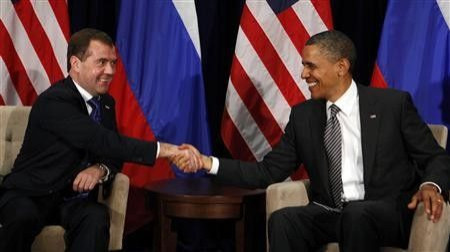Asia Pacific: Obama Says U.S., Russia to Forge ‘Common Response’ Regarding Iran

At a summit expected to produce at least the new outline of free trade agreements with key Asian markets, Middle East geopolitics took center-stage, at least initially, as the United States and Russia reaffirmed our intention to work and shape a common response so we can move Iran to follow its international obligation when it comes to its nuclear program.
U.S. President Barack Obama and Russia President Dmitry Medvedev discussed Iran, Syria, and Afghanistan during a talk in Hawaii at the Asia-Pacific Economic Cooperation forum.
Russia, China Likely to Veto New Sanctions
The support of Russia and China remain critical to the United States' effort to impose tighter international sanctions on Iran. Each is a veto-power member of the U.N. Security Council, and to-date have shown no indication that they will not veto any new sanctions resolution.
The United States and Israel, among others, argue that Iran is attempting to build a nuclear bomb under the pretense of a civilian nuclear energy program. Iran has vehemently denied the allegation.
Moreover, last week the International Atomic Energy Agency (IAEA) said that Iran appeared to have worked on developing an atomic bomb and that such research may continue.
Inching Toward Consensus on Iran?
After the Obama/Medvedev meeting, White House aides said that Russia and China remain unified with the United States and other allies in preventing Iran from developing nuclear weapons, and that Obama, Hu and Medvedev had agreed to work on the next steps, The Associated Press reported Sunday. Deputy national security adviser Ben Rhodes said the new allegations about Iran's programs demand an international response.
I think the Russians and the Chinese understand that, Rhodes said. We're going to be working with them to formulate that response.
Russia President Medvedev was less-effusive regarding the meeting's results:
We have agreed to continue the search of possible solutions, with the understanding of the fact that our positions still remain far apart, Medvedev said, Reuters reported Sunday.
Last week, after Israel President Shimon Peres said a military strike on Iran was increasingly likely, Russia's Foreign Minister Sergei Lavov warned that a military strike on Iran would be a very serious mistake, with unpredictable consequences, telegraph.co.uk reported.
Foreign Policy Analysis: An Israeli military strike on Iran is not likely: too many economic and political liabilities and costs would be associated with the action, not the least of which would be an attempt by Iran to block the flow of oil through the Strait of Hormuz to the west. Rather, look for Russia to both motivate Iran to allow more-extensive review of its nuclear facilities, to enable compliance with its international obligations, while at the same time forging a closer tie with Tehran.
Russia has repeatedly said that the era of unilateral U.S. decision-making on the international stage is over, and there is no better example of the new multi-polar political order than the Iran nuclear technology issue.
© Copyright IBTimes 2025. All rights reserved.





















